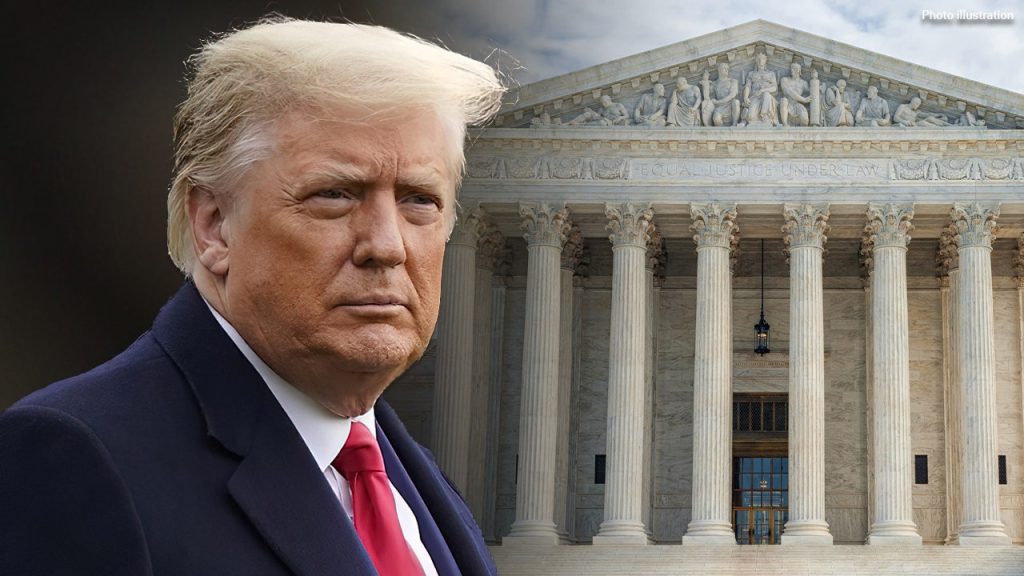The Supreme Court is set to hear a significant case next month regarding President Donald Trump‘s controversial executive order aimed at ending birthright citizenship in the United States. This case is among the most anticipated litigation reviewed by the Supreme Court since Trump’s inauguration. The justices will hear the case on May 15, involving consolidated challenges from multiple states against the president’s directive, which has sparked a nationwide debate on citizenship rights.
| Article Subheadings |
|---|
| 1) Overview of Birthright Citizenship |
| 2) Trump’s Executive Order Explained |
| 3) Legal Challenges and Injunctions |
| 4) Implications of the Supreme Court’s Decision |
| 5) Public Response and Future Outlook |
Overview of Birthright Citizenship
Birthright citizenship, which grants citizenship to any individual born on U.S. soil, is enshrined in the 14th Amendment to the Constitution. This amendment was ratified in 1868 in the wake of the Civil War, aiming to secure citizenship for former slaves and their descendants. The provision states, “All persons born or naturalized in the United States, and subject to the jurisdiction thereof, are citizens of the United States and of the State wherein they reside.” Currently, the U.S. is one of approximately 30 countries worldwide that offer birthright citizenship, a policy that has sparked various debates on immigration and national identity. The issue has gained renewed attention in the context of recent political developments and the Trump administration’s push for stricter immigration policies.
Trump’s Executive Order Explained
On his first day in office, President Donald Trump signed an executive order that sought to reinterpret birthright citizenship laws in a way that would prevent children born in the United States to undocumented immigrants from receiving automatic citizenship. This order was met with immediate legal challenges from various states and advocacy groups, leading to ongoing litigation. The administration argues that the order is necessary to secure the nation’s borders and address what it describes as a loophole in immigration policy. The administration is seeking to limit the interpretation of the 14th Amendment, asserting that those born to parents who are not U.S. citizens should not automatically be granted citizenship.
Legal Challenges and Injunctions
Following the executive order, three states—Maryland, Massachusetts, and Washington—issued nationwide injunctions to block its implementation. These legal actions were pivotal in shaping the ongoing legal battle, as they claimed the order was unconstitutional and overly broad in scope. The acting U.S. Solicitor General Sarah Harris called upon the Supreme Court to narrow the injunctions to focus on individuals specifically impacted by the order. With no federal courts siding with the Trump administration in its quest to ban birthright citizenship thus far, the Supreme Court’s pending decision represents a crucial moment in the long-standing debate over the interpretation of the 14th Amendment.
Implications of the Supreme Court’s Decision
The impending oral arguments before the Supreme Court could have far-reaching implications for immigration policy and citizenship rights in the United States. If the court sides with the Trump administration, it could set a precedent that redefines citizenship as linked to the legal status of parents, altering the practice of birthright citizenship that has stood for over a century. Conversely, a decision against the administration’s order may reaffirm existing rights and set a significant barrier against challenges to citizenship based on parentage. As the case unfolds, the implications will undoubtedly resonate beyond legal circles, influencing public policy and national discourse on immigration.
Public Response and Future Outlook
The public response surrounding Trump’s attempts to end birthright citizenship has been profoundly polarized. Advocates for immigrant rights and numerous state governments have rallied against the executive order, framing it as an unconstitutional attack on fundamental rights. On the other hand, supporters of President Trump argue that the change is necessary to safeguard national interests and ensure a fair immigration system. As the Supreme Court gears up to hear the case, the outcome could shape public sentiment on immigration policy and influence future legislative proposals. The anticipation surrounding the court’s ruling highlights the significance of the issue at hand, prompting discussions on the broader implications for American identity and immigration reform.
| No. | Key Points |
|---|---|
| 1 | The Supreme Court will hear arguments on President Trump’s executive order regarding birthright citizenship on May 15. |
| 2 | The order aims to redefine citizenship rights for children born to non-citizen parents. |
| 3 | Three states have issued nationwide injunctions against the implementation of the executive order. |
| 4 | The case raises important constitutional questions that could redefine the scope of the 14th Amendment. |
| 5 | Public opinion is deeply divided on the issue, reflecting broader anxieties surrounding immigration policy. |
Summary
As the Supreme Court prepares to hear the case challenging President Trump’s attempt to end birthright citizenship, the implications of this decision are significant. The outcome could redefine longstanding interpretations of the 14th Amendment, impacting not only the lives of countless individuals but also the future landscape of U.S. immigration policy. As public interest mounts, all eyes will be on the justices as they navigate this critical constitutional issue.
Frequently Asked Questions
Question: What is the significance of birthright citizenship in the U.S.?
Birthright citizenship is a constitutional guarantee that grants citizenship to anyone born on U.S. soil. This principle is rooted in the 14th Amendment and has been a cornerstone of American identity and law.
Question: Why did President Trump issue an executive order regarding birthright citizenship?
President Trump issued the executive order as part of his administration’s broader immigration policy, arguing that it aimed to close perceived loopholes and secure the nation’s borders by limiting citizenship rights based on parental immigration status.
Question: What are the implications if the Supreme Court rules in favor of the Trump administration?
A ruling in favor of the Trump administration could redefine citizenship criteria in the U.S. and potentially lead to tens of thousands of children being denied automatic citizenship based on their parents’ immigration status.


